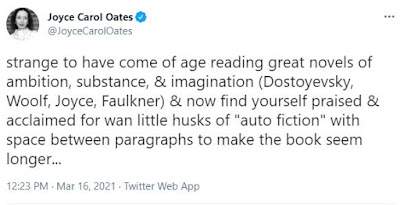| A post by Mary Fan |
The response to the shootings has been as telling to me as the tragedy itself. And it stirred up a lot of old anger and frustration that goes back years. Some of the same people who'd previously brushed off and derailed my attempts to discuss anti-Asian discrimination were now posting sad-face statuses about how shocked and appalled they were by this headline-making public tragedy. To those folks: Of course you were shocked. It's easy to be shocked by something you weren't paying attention to, even when it was right in your face. Oh, you don't remember those conversations? Well, it's only natural to forget things you didn't think mattered!
So instead of a fun bookish post, here's a sarcastic rage post. Enjoy.
How to Be a Shitty Ally
So. You’re a good person. More than that, you need everyone to KNOW you’re a good person. You have a super strong sense of right and wrong, and whatever the situation, you always have the answers. Then a public tragedy strikes and *alert**alert* this is not a drill *alert**alert*! It’s time to spring into action. Especially if the tragedy struck those with marginalizations you don’t share.
So you want to be a shitty ally, the kind who cares more about being right and appearing good than hearing what anyone else has to say. Here’s your how-to guide.
Derail the conversation with Oppression Olympics
Someone from a marginalized background brings up an issue that impacts them directly. Don’t you dare let them get away with making it about them for once! Bring up a bigger tragedy to silence them! Asian Americans trying to bring up discrimination? Well, at least it’s not the Holocaust! What are they going to say to that? You’re right, and they have to shut up.
Completely ignore what’s being said
You know, sometimes you don’t have to say anything to win at this game. Just totally ignore what the marginalized person is trying to say and change the subject, as if they never said it! Better yet, do it in a group setting so you have plausible deniability! And if you happen to cut them off, well, that makes the plausible deniability even stronger if they later try to confront you about it. After all, how could you have brushed them off if you weren’t listening in the first place?
Focus on your feelings and how the terrible things in the world affect you
You’re listening and learning. Your thoughts and prayers are with the victims. You feel SO BAD about what’s happening. You’re crying. You want to do better. You had no idea things were this bad. You don’t want to be part of the system of oppression. You want to show that you’re a good person. You. You. You. Make it all about you.
Don’t bother with little slights; only big splashy tragedies matter
Anyone remember that decade-old SNL skit with a white actor playing the Chinese president and literally saying “ching chong ching chong” over and over while a white actress “translated” with a stilted accent? Of course not! Because it was just a bit of fun—why would anyone make a big deal out of it? Remind them that they have no sense of humor and that they should relax; it’s just sketch comedy. Nothing is a big deal, not even the deaths of elders in random acts of violence. No, that’s not worth your precious ally time. That must be preserved for big splashy headline-making tragedies. Use the previous tactics mentioned. Derail. Ignore. Focus on your feelings—especially if those feelings bring up a bigger tragedy that will make the person bringing up the little slight feel awful. You win again!
Bring up people from marginalized backgrounds who disagree
Hey, someone from a marginalized background is trying to bring up that pesky old -ism conversation again, and you don’t agree! And guess what, neither does this other person from that same background! Well, then it must be okay, right? Japanese people in Japan don’t care about whitewashing Ghost in the Shell. Some Asian Americans find Mickey Rooney’s character in Breakfast at Tiffany’s absolutely hilarious! You’re right, and they’re wrong because they’re treating their own identity as a monolith when it ain’t so! Checkmate!
Refuse to see differences
You’re a humanist. You don’t see color, or gender, or anything else. The entirety of homo sapiens is like the mascot from Community—a featureless blob. And if you don’t see any of these things, how could you possibly wrong anyone?
Always remember, you have all the answers
“Well, actually” are your favorite words. Ok, so maybe it’s more of an attitude—now that those actual words are known, you might dance around them instead. But it all comes down to the same meaning: You have all the answers, and they, whoever they are, know nothing, even regarding their own experience. In fact, you know better because they can only speak to their own experience while you, in all your wisdom, know of every experience! When in doubt, interrupt and bring up someone more marginalized. Shift the conversation away from something they have background in, into one that’s either all about you or about something neither of you can really speak to. You’re right, and they’re wrong.
Congratulations, you’re a shitty ally. Change your profile pic to a damn safety pin.











